


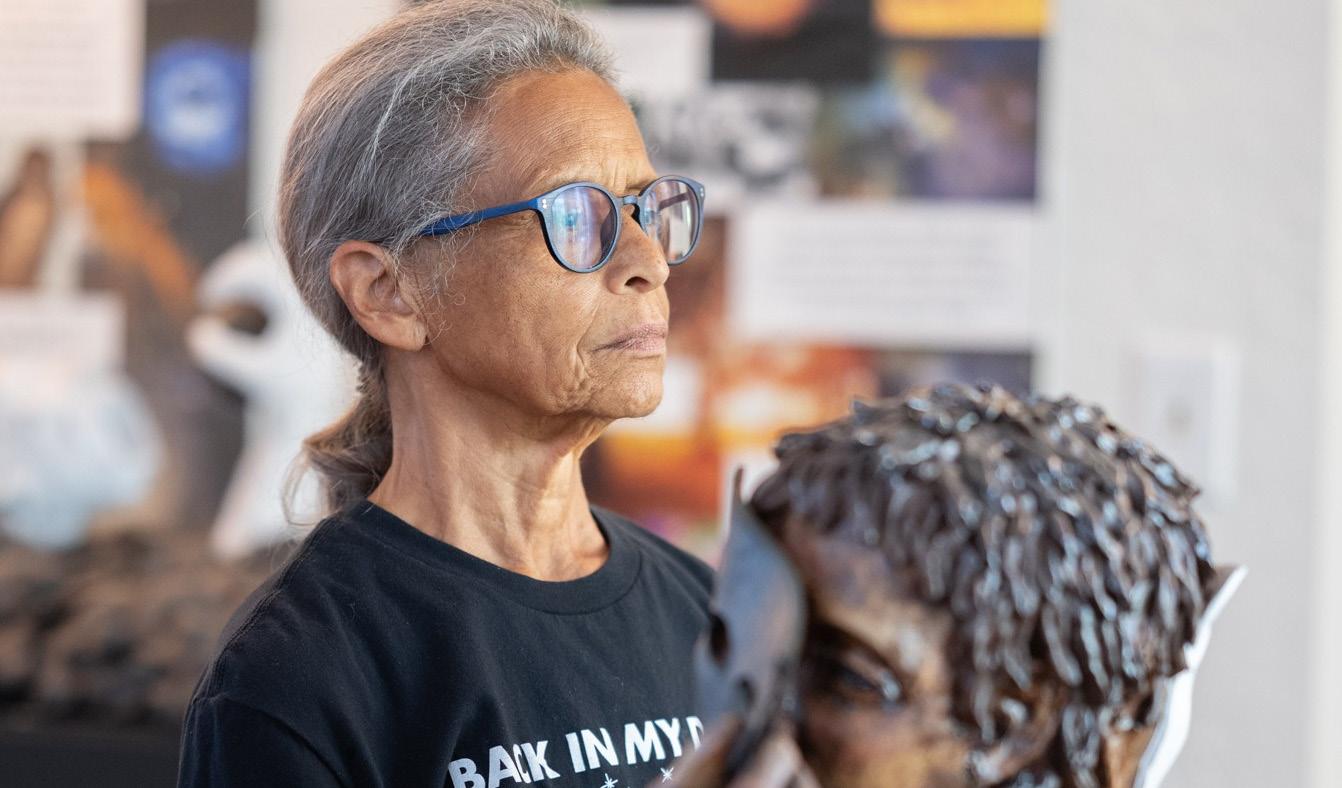







By Ken Epstein
David Pokorny, 45, of El Cerrito, has been charged with mailing racist death threats to Oakland Mayor Barbara Lee.
Arrested last week, Pokorny faces a felony for threatening a public official and also hate-crime allegations. He has pleaded not guilty.
The first email, sent Sept. 7, used racial slurs to refer to Black Oakland residents. The sender threatened to kill them, as well as government officials, including Lee, police officers, and judges.
The most recent email, sent Sept. 21, directly threatened Lee:
“You are a psychopath,” the sender wrote, “and I’m going to torture and murder you.”
Responding, Mayor Lee said, “Violence has no place in our city or our democracy. Intimidation and hate will not silence Oakland public servants or the communities we represent. We will continue to do the people’s work — regardless of circumstances.”
Pokorny was arrested Oct. 7 in Southern California and booked into Santa Rita Jail. As of Wednesday, he remained in custody, with bail set at $70,000.

By Carla Thomas

By Zac Unger
We are so proud to honor the legacy of the great Bobby Seale by commemoratively renaming 57th Street and Martin Luther King Jr. Way to Bobby Seale Way in North Oakland. Seale, 88, has dedicated his life to advancing social justice, racial equality, and community self-determination. He played an incredibly important part in the history of our country by cofounding the Black Panther Party for Self Defense, in Oakland in 1966 with the late Huey Newton.
Our City has a tremendous history of activism, and it is a legacy we are proud of and strive to continue as our community and country face so many incredible challenges right now.
In 1962, Bobby Seale and Virtual Murrell cofounded the first known Black student organization called the Soul Students Advisory Council at Oakland City College located at 57th and Grove streets, now MLK. Jr. Way. Later they co-founded the first Negro history class, which led
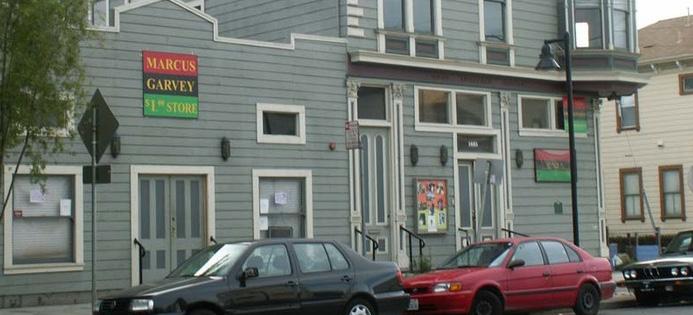

By Ken Epstein
The Office of Oakland Mayor Barbara Lee has responded to the announcement that OPD Chief Floyd Mitchell has decided to resign.


to
“I want to thank Chief Mitchell for his dedicated service to Oakland and his leadership during a critical time for our city,” said Mayor Lee.
“Under his tenure, we have
Chief Mitchell announced last week that he will be stepping down from his position after 18 months. His final day will be Dec. 5.

By Post Staff
The Port of Oakland handled 178,942 twenty-foot containers (TEUs) in September 2025, a 6.6% decline year-over-year and 7% below August volumes. Port officials said the decrease reflects market adjustments tied to tariff uncertainty and shifting

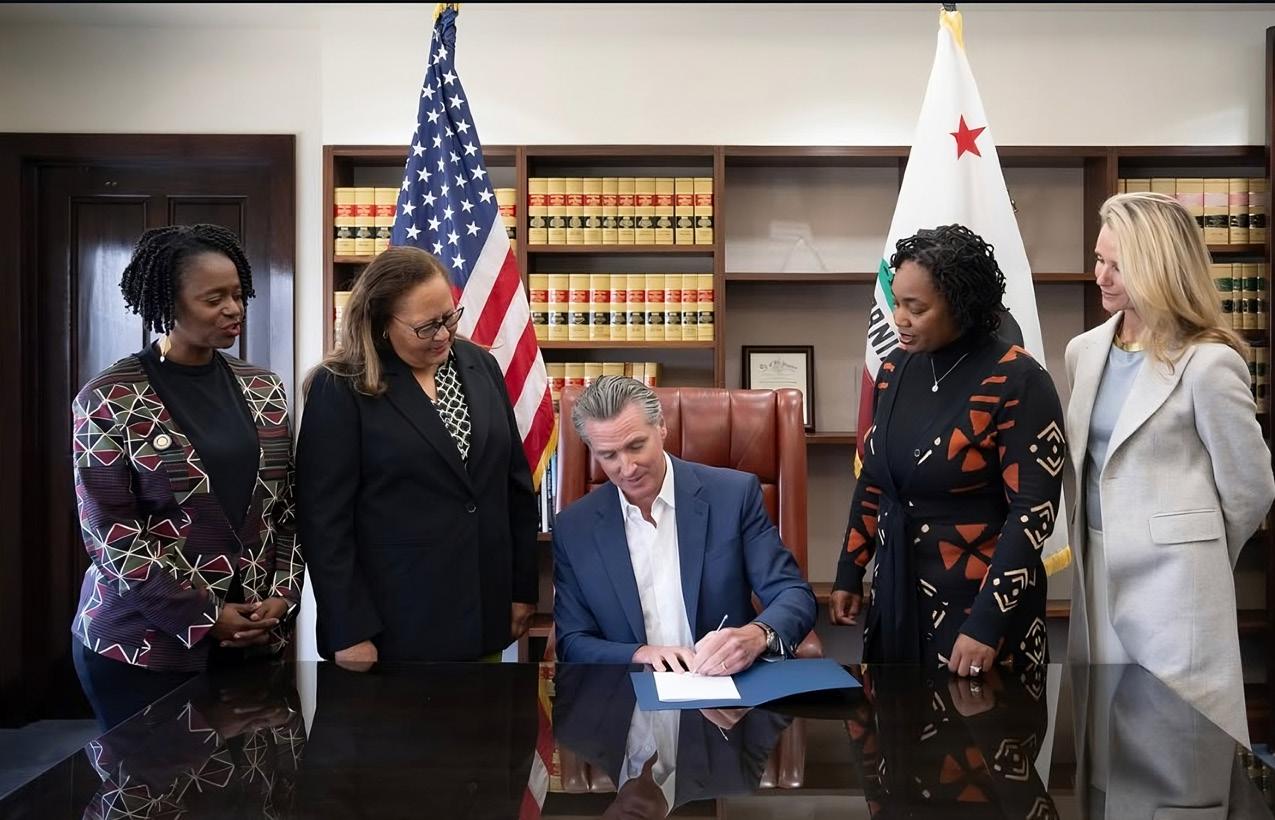

By Bo Tefu California Black Media

By Bo Tefu, California Black Media
in government.
By Antonio Ray Harvey California Black Media
Gov. Gavin Newsom has signed Senate Bill (SB) 518, landmark legislation creating California’s Bureau for Descendants of American Slavery — the first state agency in the nation dedicated to implementing reparations for Black Americans.
“A few days ago, I, with a few other members of the California Legislative Black Caucus (CLBC), met with Gov. Newsom as he signed my bill SB 518 – the Bureau for Descendants of American Slavery,” said Sen. Akilah Weber Pierson (D-San Diego), chair of the CLBC and author of the bill. “California has taken a monumental and historic step toward justice, becoming the first state in the nation to create a permanent agency dedicated to reparative justice for Black Americans.”
The governor first hinted at the signing during an appearance on the Higher Learning podcast, hosted by Rachel Lindsay and Van Lathan Jr., before his office made the news official in an Oct. 10 press release. “I just signed a bill two days ago with the (California Legislative) Black Caucus as it relates to creating a new office to address these systemic issues,” Newsom told the hosts.
Authored by Weber Pierson, SB 518 establishes a permanent state agency tasked with implementing reparations policies
for descendants of enslaved African Americans and those whose families were harmed by racially motivated eminent domain in California. The Bureau will verify eligibility, safeguard privacy, educate the public, and coordinate future reparative justice initiatives.
“For centuries, the descendants of enslaved people have endured hardship, exclusion, and systemic injustice that denied them access to opportunity and equality,”
Weber Pierson said in a statement.
“SB 518 is a step toward acknowledging that painful truth and creating the structures needed to repair it. This bill represents hope, responsibility, and a commitment to make right what was wrong for far too long.”
The legislation was directly based on policy recommendations from the Task Force to Study and Develop Reparation Proposals for African Americans, which issued its comprehensive final report in June 2023. The task force was created through Assembly Bill (AB) 3121, authored by current Secretary of State Shirley Weber in 2020, to research the history of discrimination against Black Californians and recommend remedies for compensation and atonement.
SB 518 is part of the CLBC’s Road to Repair 2025 Priority Bill Package, which aims to implement the task force’s recommendations.
Continued on page 6
NOTICE AND DIGEST
California State Controller
Malia Cohen has officially launched her bid for reelection, highlighting her commitment to transparency, accountability, and equity in state finances. In a social media video announcement last week, Cohen outlined her priorities for ensuring every Californian benefits from the state’s economic growth.
Cohen’s platform emphasizes policies she says are aimed at improving residents’ lives, including affordable housing, retirement security, health care access, reproductive rights, equal protection under the law, and environmental sustainability.
“It’s official: I’m running for reelection as your State Controller! Together we’ve made California’s finances more transparent, accountable, and equitable. Let’s keep building on that progress,” Cohen said in her
social media post. She stressed that California’s budget “isn’t just numbers on a page — it’s a roadmap for our future,” pledging to continue ensuring every dollar is invested wisely.
Cohen highlighted her top priorities, which include addressing California’s housing crisis, ensuring retirement security, and building an economy that works for all Californians. She also emphasized expanding affordable health care, protecting reproductive access, upholding equal rights, and taking action to protect the environment. Each issue, she said, is part of a broader effort to strengthen communities across the state.
“I’m running for reelection to keep driving transparency, efficiency, and fairness so that every Californian can share in our state’s prosperity,” Cohen added.
For more details on Cohen’s priorities and policy plans, visit Malia Cohen for California.
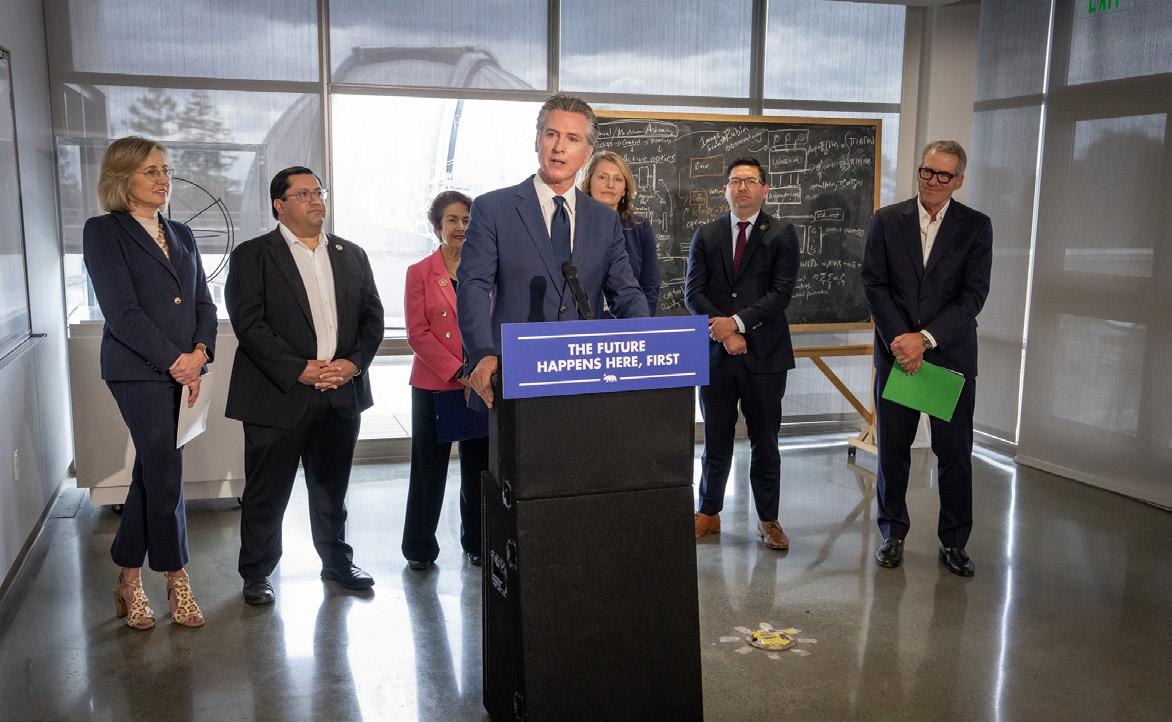
By Bo Tefu California Black Media
Gov. Gavin Newsom signed
a bipartisan package of bills last week aimed at improving California’s insurer of last resort for fires, the California FAIR Plan, follow-
ORDINANCE ESTABLISHING A MIDDLE INCOME JOINT POWERS AUTHORITY BOND FINANCING PROGRAM FOR THE PURPOSE OF FINANCING THE ACQUISITION, CONSTRUCTION AND IMPROVEMENT OF OAKLAND MIDDLE INCOME HOUSING PROJECTS; AUTHORIZING THE CITY ADMINISTRATOR TO JOIN JOINT POWERS AUTHORITIES, ENTER INTO JOINT EXERCISE OF POWERS AGREEMENTS AND OTHER AGREEMENTS WITH MUNICIPAL FINANCE AGENCIES UNDER THE PROGRAM, AND APPROVE THE ISSUANCE OF REVENUE BONDS BY SAID AGENCIES FOR OAKLAND PROJECTS IDENTIFIED BY THE CITY ADMINISTRATOR, WITHOUT RETURNING TO CITY COUNCIL; AND MAKING RELATED CEQA FINDINGS
This Ordinance establishes a Middle Income Joint Powers Authority Bond Financing Program for the purpose of financing the acquisition, construction and improvement of middle income housing projects within Oakland. This Ordinance authorizes the City Administrator to join joint powers authorities and enter into joint exercise of powers agreements and other agreements with municipal finance agencies under the Program. This Ordinance also approves the issuance of revenue bonds by said municipal finance agencies for Oakland projects identified by the City Administrator, without returning to the City Council. Finally, this Ordinance make findings under the California Environmental Quality Act (CEQA) with respect to this action
Notice of Publication
This Ordinance was introduced at the City Council meeting, Tuesday evening, October 7, 2025, and passed to print 7 Ayes; 1 Excused - Houston. Final adoption has been scheduled for the City Council meeting Tuesday evening October 21, 2025, 3:30 P.M., at One Frank H. Ogawa Plaza, Council Chamber, 3rd floor, Oakland, California, and via Teleconference. Three full copies are available for use and examination by the public in the Office of the City Clerk at One Frank H. Ogawa Plaza, 1st floor, Oakland, California. ASHA REED, City Clerk Publication Date: Friday, October 17, 2025 ‘A Promise Kept’:
ing a reported $4 billion loss.
That loss, officials say, is primarily due to the devastating fires that broke out in Los Angeles County earlier this year.
Newsom’s office says the legislation is designed to stabilize the state’s home insurance market and protect residents from climatedriven disasters.
The new laws provide the FAIR Plan with stronger financing mechanisms to pay claims faster, improve oversight, enhance the policyholder experience, add coverage for manufactured homes, and require the California Department of Insurance to review home hardening measures every five years as part of wildfire resilience efforts.
“These crucial reforms to the FAIR Plan mark a significant step forward in protecting consumers, stabilizing the market, and enhancing transparency,” said Insurance Commissioner Ricardo Lara in a statement on Oct. 9.
“As we tackle availability concerns and ensure that insurance companies provide consumers with policies in the traditional market, the FAIR Plan must offer essential support to its customers,” he continued. “I am grateful to Governor Newsom for his continued leadership and to the legislators who have worked on these vital issues, which will greatly ben-
California State Sen. Akilah Weber Pierson (D-San Diego) says the federal government’s decision to cut Medicaid funding could devastate families who depend on Medi-Cal for essential health services. In the first episode of her new iHeartRadio podcast, Prescribing a Healthier Future, Weber Pierson connects these potential cuts to broader political shifts she says are undermining equity and public health.
Weber Pierson and featured guest, Democratic strategist Will Rodriguez-Kennedy, discussed how changes to congressional representation and redistricting in other states, such as Texas, could reduce California’s share of federal funds. They argued that those budget changes would have real consequences for working families, seniors, and communities of color.
Weber Pierson warns that threats to Medi-Cal are not isolated budget issues but part of a larger struggle over who gets access to health care and who has a voice
“When you are silenced, or when you silence yourself, that is when we find ourselves and our communities in peril,” said Weber Pierson.
She emphasized that stable health funding supports programs like CalFresh and hospital systems that rely on predictable federal reimbursements.
Rodriguez-Kennedy added that fair representation in Congress helps ensure California continues to receive funding that matches its population and needs. If those balances shift, he said, the state’s health care system could face deep strain, with hospitals and clinics losing critical revenue.
Weber Pierson urged Californians to stay engaged ahead of the November election, pointing to Proposition 50, a ballot measure that would allow California to temporarily redraw its congressional districts to favor Democrats until 2030. She said the proposal would help protect California’s political influence and, by extension, its access to health care funding.

By Antonio Ray Harvey California Black Media
Editor’s Note:
This week, our coverage highlights perspectives from supporters of Proposition 50. Black publishers, editors, and writers met with Gov. Gavin Newsom and members of the “Say Yes to Prop 50” coalition to discuss their views on California’s redistricting efforts and their potential impacts. Last week, we featured the viewpoints of Proposition 50’s opponents.
On Oct. 7, members of the California Congressional Black Caucus (CBC), the California Legislative Black Caucus (CLBC), and Gov. Gavin Newsom briefed Black media across the state, urging support for Proposition 50 — The Election Rigging Response Act — ahead of the upcoming special election.
“We’re talking to the Black press to translate what is at stake here,” said Simon. “The Black press, historically, has been the cavalry for civil rights in this country. We hope you will translate what’s at stake to the voters who have the most power in the state.”
Placed on the ballot by Newsom and legislative leaders in August, Proposition 50 would allow the Legislature to adopt temporary congressional district maps for the 2026, 2028 and 2030 elections. After that, authority would return to the state’s independent Citizens Redistricting Commission in 2031. The special election will be held on Nov. 4; vote-bymail ballots are being sent to all active, registered voters, and inperson voting will be available statewide.
Supporters say Prop 50 counters national efforts they contend have diluted voters of color in
U.S. Reps. Sydney KamlagerDove (D-CA-37) and Lateefah Simon (D-CA-12) joined Newsom and CLBC chair, State Sen. Akilah Weber Pierson (D–San Diego). to present the case that the measure is a targeted, temporary step to safeguard Black and Brown voting power.


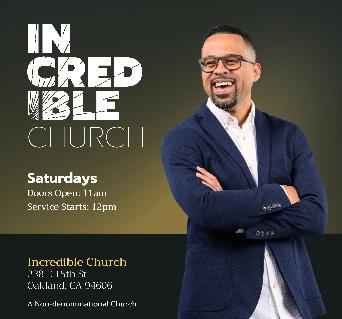
Dedicated staff needed to work with individuals with developmental disabilities in communitybased settings, or environments.
Qualifications: High school or equivalent. Driver’s license. Dependable and efficient. Background check. Physical exam and TB test. Training available. Decent wages. Please call (510) 690-9570.
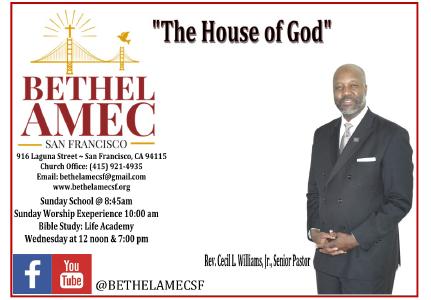
and dancer/choreographer who each receive $800,000 over
By McKenzie Jackson California Black Media

By Terri Schlichenmeyer
Bookworm Sez
The
Author: Debra J. Stone, Copyright: c.2025, Publisher: University of Minnesota Press, SRP:
$17.95, Page Count: 104 pages
You remember how the sun streamed through the window.
It lit up a dance of dust as you lay on a scratchy rug to watch the show, and you recall it — every chink in the countertops, each squeaky floorboard, and the perfect-for-reading spot on the front step. The house you grew up in still stands in your memories and that’s a good thing. As in the new book, “The House on Rondo” by Debra J. Stone, memories are all that’s left.
Thirteen-year-old Zenobia understood why Mama and Daddy
a five-year period to spend as they
were sending her and her brother and sister to St. Paul for the summer. Still, she begged to stay home and promised that she’d help Mama heal from her stroke, but Daddy was firm: Zenobia, Fannie, and Mookie would spend the summer with Grandma Essie and Grandpa Joe across the river from Minneapolis. It was for the best. And it was good: every Sunday as long as she could remember, Zenobia’s family had made the long drive to St. Paul and so she knew the neighborhood. She even had friends in her grandparents’ neighborhood, and one of them loved Wonder Woman comics as much as Zenobia did. There was a library nearby and a great big back yard to play in.
A summer was a long time
erts is excerpted from the MacArthur Fellows web site.
A graduate of Yale University with a law degree from Harvard, Dorothy Roberts is a legal scholar and public policy researcher exposing racial inequities embedded within health and social service systems.
to be away from Minneapolis, but she’d be home soon. In the meantime, Zenobia spent time in Grandma Essie’s kitchen, learning about her family and hearing stories from a long time ago, and Zenobia read lots of books. And she didn’t mean to, exactly, but she listened in on grown-up conversations.
Sine 2012, she has been a professor of Law and Sociology, and on the faculty in the department of Africana Studies at the University of Pennsylvania.
Roberts’s work encompasses reproductive health, bioethics, and child welfare. She sheds light on systemic inequities, amplifies the voices of those directly affected, and boldly calls for wholesale transformation of existing systems.
It was 1963 and the interstate was coming through the neighborhood, taking up house after paid-for house and the residents along Rondo Avenue were angry and upset. And really, so was Zenobia. Where would everyone live? Where would they go? Would life be the same without Rondo Avenue?
Roberts’s early work focused on Black women’s reproductive rights and their fight for reproductive justice. In “Killing the Black
Set in real-life cities with reallife events, “The House on Rondo” even features photos of people and houses from the heyday of the Rondo Neighborhood in St. Paul. Yes, this book is fiction, but it’s also deeply based in fact.
While author Debra J. Stone shares lots of joy in her story, there’s also a keen sense of mournfulness suffused in what you’ll read, along with fear and uncertainty from a child’s viewpoint. Anger is a suitable emotion, too, especially when you know the background here. Even fictionalized, reading about the racism and loss of heritage in 1963 is like tasting something metallic and sour.
Curiously, you’ll likely find this book in the kids’ section of the library or bookstore, though there are some pretty grown-up concepts here, things that are authentic to life six decades ago but that may also nudge the appropriate age up a notch. Just beware.
At the very least, they make the book equally good for adults, too - and so don’t just leave this book out for your child. Pick it up yourself and read it, too. “The House on Rondo” opens a great window for discussion.
Body: Race, Reproduction, and the Meaning of Liberty 1997)”, she analyzes historical and contemporary policies and practices that denied agency to Black women and sought to control their childbearing—from forced procreation during slavery, to coercive sterilization and welfare reform—and advocates for an expanded understanding of reproductive freedom.
A clash between Congressional Democrats and Republicans over key provisions of the nation’s health care policy continues to be a point of contention as the federal government shutdown, which began on Oct. 1, drags on.
U.S. Rep. Pete Aguilar (D-CA33) told constituents during a virtual town hall meeting hours before the shutdown began that the lapse in appropriations occurred because Republican lawmakers refused to reverse health insurance cuts introduced in the president’s signature “One Big Beautiful Bill,” signed into law in July.
This work prompted Roberts to examine the treatment of children of color in the U.S. child welfare system.
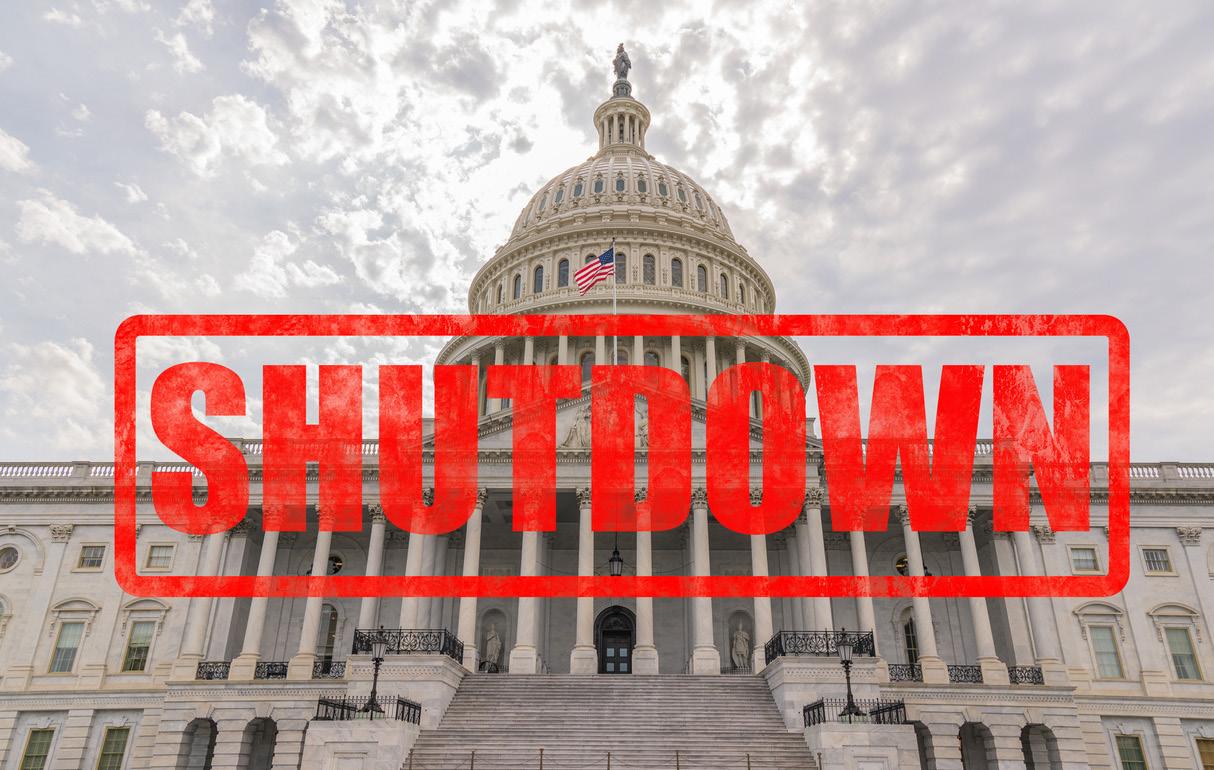
white children to be removed from their families after CPS referral.
She also shows that blaming tural problems, while ignoring the historical roots of economic and social inequality, fails families and grained oppressive features of the tirely new approach focused on supporting families rather than punishing them.
After nearly two decades of research and advocacy work alongside parents, social workers, family defense lawyers, and organizations, Roberts has concluded that the current child welfare system is in fact a system of family policing with alarmingly unequal practices and outcomes. Her 2001 book, “Shattered Bonds: The Color of Child Welfare,” details the outsized role that race and class play in determining who is subject to
The measure, Aguilar said, gives billionaires and wealthy corporations tax cuts at the expense of what he called the biggest health care cut in U.S. history.
“As a result, 15 million Amer-
In “Torn Apart: How the Child Welfare System Destroys Black Families—and How Abolition Can Build a Safer World (2022),”
Roberts traces the historical, cultural, and political forces driving the racial and class imbalance in child welfare interventions.
icans will lose health care — including 3.4 million Californians on Medi-Cal,” he said. “These sound like big numbers, but they have very real consequences. Hospitals will close; children won’t get their medication; seniors won’t be able to see their doctor; and your neighbors will get sick.”
The legislation cuts up to $1 trillion from Medicaid, the nation’s safety net health service, known as
These include stereotypes about Black parents as negligent, devaluation of Black family bonds, and stigmatization of parenting practices that fall outside a narrow set
Medi-Cal in California, and food assistance to offset increased federal spending and reduced tax revenue.
Another key point of contention is the rising premiums for health care plans sold on the Affordable Care Act (ACA) marketplaces, popularly
Her support for dismantling the current system of child welfare is unsettling to some, but her provocation inspires many to think more critically about its poor track record and harmful design. By uncovering the complex forces underlying social systems and institutions, and uplifting the experiences of people caught up in them, Roberts creates opportunities to imagine and build more uitable and responsive ways to ensure child and family safety.




Continued from page 4
expire at the end of the year. Those tax credits have kept ACA plans affordable for at least 22 million people — including two million Californians — since 2021.
Democrats want to extend the expiring subsidies and reverse the Medicaid cuts in the legislation Trump often touts as his “Big Beautiful Bill.” Republicans have balked at the proposal, claiming it would cost Americans more than $1 trillion.
According to the Congressional Budget Office, approximately four million people are expected to go without health coverage next year because they can no longer afford it. Extending the subsidies would cost the federal government around $350 billion over the next decade.
Aguilar, chair of the House Democratic Caucus since 2023, said during his online town hall that the health care crisis will worsen if Congress fails to extend the tax credits.
“For example, a 60-year-old
the-Nation Reparations Agency ...
Continued from page 2
The bill was supported by 15 community, equity, and legal organizations, along with three former task force members, including former chairperson Kamilah V. Moore.
Not all advocates share that optimism. The Coalition for a Just and Equitable California (CJEC) has criticized SB 518, arguing it doesn’t go far enough to provide immediate redress.
“Let’s be clear — SB 518 is not real Reparations, nor is it a step
couple earning $82,000 a year will see their annual premiums rise to nearly $14,000,” he explained.
“This is unacceptable. At a time when Californians are already struggling to afford everything from gas to groceries, we can’t allow health care to be another basic necessity that is out of reach.”
The health care cuts in Trump’s signature legislation don’t go into effect until 2027. Aguilar said Republicans composed the mega tax and spending bill that way, so the fallout wouldn’t become a political issue before the 2026 midterm elections.
“They want everyone to think things are ok when you go in to vote for Congress, and you vote for federal offices next year,” he said.
“They have tried to insulate themselves from the political attack by making all these cuts happen in 2027. What they failed to calculate is that health insurance companies have to set these premiums. They have to set them based on what the conditions look like in the years ahead, so premium increases are going to continue to happen.”
closer to real Reparations,” CJEC spokesperson Chris Lodgson said. “It’s a bureaucratic shell that delays Reparations, expands beyond the lineage it claims to serve, and diverts precious time and resources away from the real work of repair.”
Weber Pierson said she and the CLBC remain committed to addressing structural disparities in California. “SB 518 is not just policy – it is a promise kept,” she said. “It honors the truth, dignity, and humanity of descendants of enslaved people and begins the process of healing wounds that have gone unaddressed for generations.”
Continued from page 2
other states. Opponents argue it’s a partisan power grab that could reduce Republicans’ nine California House seats to five. Newsom rejected the “slippery slope” critique.
“Doing nothing guarantees we continue to lose checks and balances. This is not a slippery slope—it’s a response to an emergency,” said Newsom. “It’s high time Democrats do something meaningful and substantive. That’s what we’re doing.”
Newsom said the measure responds directly to Pres. Donald Trump’s unprecedented phone call to Texas Gov. Greg Abbott directing a mid-decade redistricting plan to secure five additional Republican congressional seats.
Kamlager-Dove called Prop 50 “a moral defense” against voter suppression and misinformation, emphasizing that the change is time-limited. She framed it as pushback against moves in states like Texas, Missouri, Indiana,
Continued from page 2
efit communities most at risk of wildfires.”
The bills signed in the package are:
● AB 1 by Assemblymember Damon Connolly (D-San Rafael), addressing residential property insurance and wildfire risk
● AB 226 by Assemblymember Lisa Calderon (D-Whittier), strengthening the FAIR Plan Association
● AB 234 by Assemblymember Lisa Calderon (D-Whittier), improving the FAIR Plan governing committee
● AB 290 by Assemblymember Rebecca Bauer-Kahan (DOrinda), enabling automatic payments
Ohio and Florida, and criticized actions by the Trump administration that she said have harmed Black communities.
She also addressed criticisms that Prop 50 dismantles California’s independent redistricting commission.
“The maps were shared with the Legislature, posted online, and every voter will see them on their ballot,” she said. “You can’t get any more transparent than that. It’s temporary, it’s fair, and it protects representation when it’s most under attack.”
Weber Pierson said the caucus views Prop 50 as an extraordinary but necessary step to preserve fair representation until the commission resumes its role.
She called Prop 50 “a temporary but essential shield” to protect communities of color across the nation.
“There’s a very strategic, wellfunded campaign to erase Black voters,” Simon said. “Prop 50 says not today, not ever.”
CBM staff Joe W. Bowers Jr. and Solomon O. Smith contributed to this report.
● SB 525 by Sen. Brian Jones (RSan Diego), expanding coverage to manufactured homes
Newsom noted that the legislation builds on prior efforts, including a 2023 executive order directing swift action to stabilize the insurance market, expand coverage, and maintain strong consumer protections.
Despite rising rates due to climate risks, California’s insurance premiums remain among the lowest in the nation, he assured.
“The kinds of climate-fueled firestorms we saw in January will only continue to worsen,” Newsom said. “That’s why we’re taking action now to strengthen California’s insurance market and make it more resilient in the face of the climate crisis.”
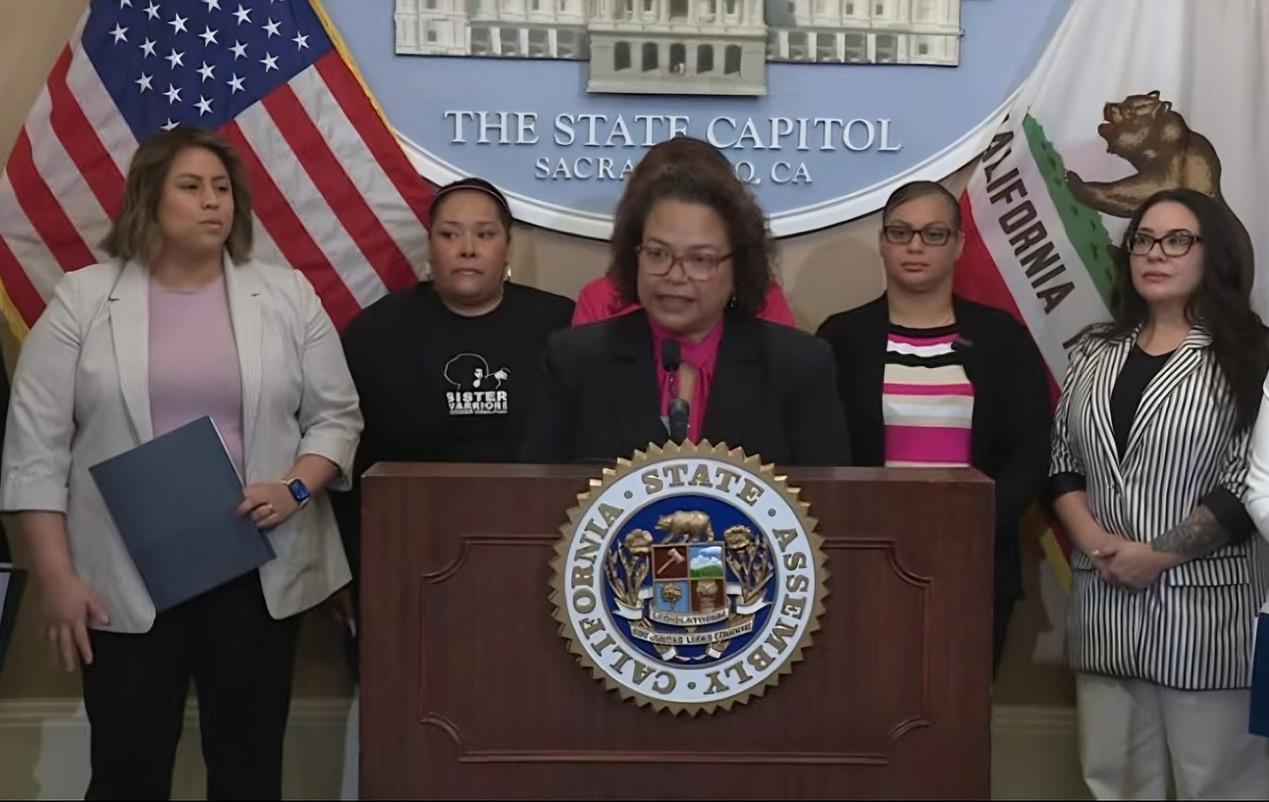
By Antonio Ray Harvey California Black Media
Assemblymembers Mia Bonta (D-Alameda) and Corey Jackson (D-Moreno Valley), members of the California Legislative Black Caucus (CLBC), are celebrating the signing of two of their bills aimed at improving education outcomes — one reforming the student expulsion process, and the other strengthening the state’s early childhood education system.
Gov. Gavin Newsom signed Assembly Bill (AB) 1230, authored by Bonta, on Oct. 3. The new law, known as the Expulsion Rehabilitation Plan Reform, improves the rehabilitation and readmission process for students expelled from schools in California.
Under AB 1230, school districts are now required to help students access the resources necessary to complete their rehabilitation plans and ensure that financial or transportation barriers do not prevent readmission.
“AB 1230 is now law. Togeth-
er, we’re ensuring students facing expulsion get the individualized support they need to learn, grow, and thrive. Grateful to (Gov. Newsom) for standing with us to fight the ‘school-to-prison pipeline,’” Bonta stated.
The law addresses long-standing shortcomings in California’s expulsion system, where vague rehabilitation plans and procedural barriers often lead to prolonged exclusion from school. The measure also limits extensions of expulsion terms to one additional semester at a time.
Data cited by EdSource shows that more than 4,000 California students were expelled in the 2023–24 school year, with disproportionate impacts on students of color and other vulnerable youth. Although overall suspension rates have dropped over the past decade, 8.6% of Black students were removed from classrooms in 2023–24, compared to 2.7% of White students.
“This much-needed reform is about opportunity for students,

By Bo Tefu, California Black Media
California students have made significant progress in statewide assessments, according to the latest results from the California Department of Education.
The 2024–25 school year saw an increase in the percentage of students meeting or exceeding grade-level expectations: 70.6% in English language arts (ELA), 61% in mathematics, and 86% in science. These gains are particularly notable among Black, Hispanic, and socioeconomically disadvantaged students.
Gov. Gavin Newsom attributed these improvements to targeted investments in education, including Universal Transitional Kindergarten, reading coaches, and community schools.
“These gains reflect the impact of these investments and the hard work of educators,” said State Superintendent of Public Instruction Tony Thurmond.
Despite the positive trends,
challenges remain. Approximately 29% of students in ELA, 39% in math, and 14% in science scored at the “minimal” level, indicating areas that still require attention.
To address these challenges, Gov. Newsom signed Assembly Bill (AB) 1454 on Oct. 9. That legislation allocates $200 million to support literacy initiatives aimed at improving reading achievement across the state.
The legislation is part of the Golden State Literacy Plan, which seeks to implement evidence-based reading instruction methods.
“With AB 1454, every elementary and middle school classroom in this state will have instructional materials aligned with effective reading strategies,” said Marshall Tuck, CEO of EdVoice.
While the state has made commendable progress, continued efforts are necessary to ensure all students achieve proficiency in key subjects.

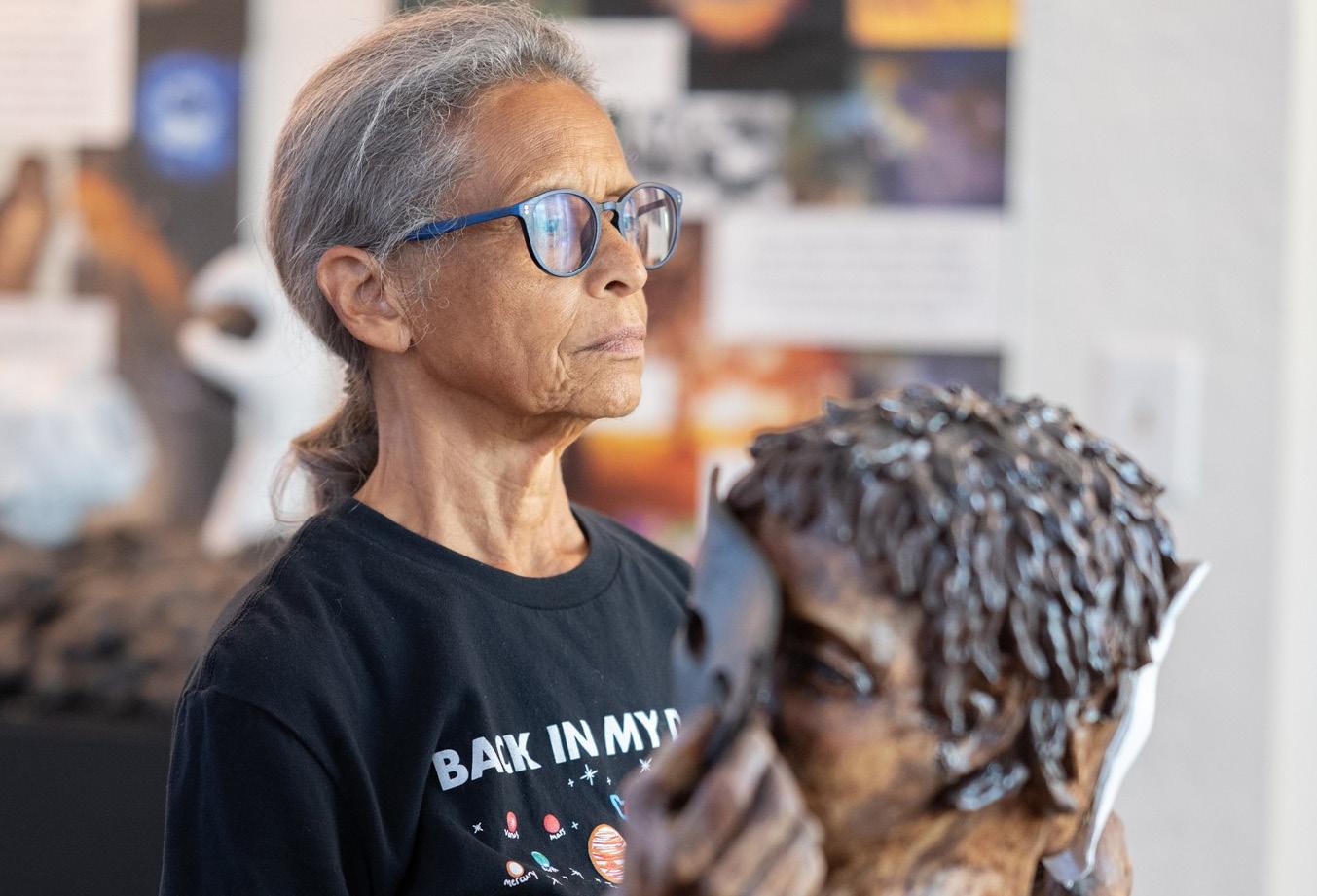
By Dr. Lorraine Bonner
Special to California Black Media Partners
I went to a medical school that was steeped in the principles of classical western medicine. However, I also learned mindfulness meditation during that time, which opened me to the multifaceted relationship between illnesses and the interconnecting environmental, mental and emotional realities that can impact an individual’s health.
Therefore, when I began to practice medicine, I also pursued training in hypnosis, relaxation techniques, meditation and guided imagery, to bring a mind-body focus to my work in both medical care and prevention.
The people I saw in my practice had a mix of problems, including high blood pressure, diabetes and a variety of pain issues. I taught almost everyone relaxation breathing and made some general relaxation tapes. To anyone who was willing, I offered guided imagery.
“My work embraced an approach to wellness I call “Liberatory Health” — one that not only addresses the treatment and management of disease symptoms but also seeks to dismantle the conditions that make people sick in the first place.”
moving into a larger consciousness. Willingness to move beyond the delusion of our separateness can show us new ways of working and living together.
To put these ideas into practical form, I would quote the immortal Mr. Rogers: “Find the helpers.” There are already people in every community working for liberation. Some of them are running for office, others are giving food to those who need it. Some are volunteering in schools, libraries or hospitals. Some are studying liberation movements, or are working in urban or community gardens, or learning to practice restorative and transformative justice, or creating liberation art, music, dance, theater or writing. Some are mentoring high schoolers or apprenticing young people in a trade. There are many places where compassionate humans are finding other humans and working together for a better world.
A more compassionate world is possible, one in which we will all enjoy better health. Creating it will make us healthier, too.
...
Continued from page 6
and will benefit children and youth across the state of California,” said Shakti Belway, Executive Director of NCYL. “Thank you to Assemblymember Bonta and the Alameda County Office of Education for championing students and helping to ensure that they receive the support and tools they need to be successful.”
Gov. Newsom also signed AB 563, authored by Assemblymember Corey Jackson, which enhances the oversight and effectiveness of the Early Childhood Policy Council (ECPC).
The new law requires the ECPC to include specific data analysis and policy recommendations in its annual report to the Legislature. The council, established in 2019, advises on planning, implementation, and evaluation of California’s Master Plan for Early Learning and Care, ensuring equitable access to early education services for diverse
populations.
“AB 563 aims to provide actionable recommendations to strengthen California’s early childhood and care system, and it allows for smoother transitions into the K–12 system by adding requirements for the Early Childhood Education Planning Council’s annual report,” Jackson stated.
Members of the ECPC are appointed by the Governor, the Senate, the Assembly, and the State Superintendent of Public Instruction.
Jackson says he introduced AB 563 to address fragmentation in California’s early childhood system and ensure that data-driven, actionable solutions are presented to lawmakers. The annual report must now include the system’s successes, challenges, and gaps, along with recommendations to advance the state’s vision for children, families, and communities.
“High-quality early care and education is critical to a child’s development and long-term success,” Jackson stated in April.

By Bo Tefu, California Black Media
On Oct. 7, Gov. Gavin Newsom signed two landmark bills aimed at combating hate and anti-Semitism in California schools.
The legislation strengthens accountability in schools by requiring stricter reporting and responses to incidents of hate and antiSemitism.
Assembly Bill 715 and Senate Bill 48 introduce new measures that hold schools accountable and provide clearer guidance on preventing and addressing discrimination. Lawmakers emphasized the bills’ importance in protecting students from harassment and creating learning spaces free from
Continued on page 8
NOTICE AND DIGEST
From my perspective, illness is only the outermost manifestation of our efforts to cope, often fueled by addictions such as sugar, tobacco, or alcohol, shackled by an individualistic cult belief that we have only ourselves to blame for our suffering.
At the deepest and also most expansive level of reality, we are all part of the same being, our bodies made from the minerals of the earth, our spirits infused by the spiritual breath that animates the universe. Willingness to move more deeply into fear and pain is the first step toward
ORDINANCE (1) DECLARING THE CITY-OWNED RESIDENTIAL REAL PROPERTY LOCATED AT 1226 73RD AVE (PROPERTY) EXEMPT SURPLUS LAND AND (2) AUTHORIZING THE CITY ADMINISTRATOR TO: (A) LIST THE PROPERTY ON THE OPEN MARKET, (B) NEGOTIATE WITH ANY OR ALL INTERESTED PURCHASERS, AND (C) ENTER INTO AN AGREEMENT TO DISPOSE OF THE PROPERTY TO THE SELECTED PURCHASER FOR ITS FAIR MARKET VALUE AS DETERMINED BY THE CITY ADMINISTRATOR
This Ordinance would declare the City-owned property located at 1226 73rd Ave as exempt surplus land under the Surplus Land Act and would authorize the City Administrator to list the property on the open market, negotiate with interested purchasers, and dispose of the property to the purchaser selected by the City Administrator for the fair market value determined by the City Administrator.
Notice of Publication
This Ordinance was introduced at the City Council meeting, Tuesday evening, October 7, 2025, and passed to print 7 Ayes; 1 Excused - Houston. Final adoption has been scheduled for the City Council meeting Tuesday evening October 21, 2025, 3:30 P.M., at One Frank H. Ogawa Plaza, Council Chamber, 3rd floor, Oakland, California, and via Teleconference. Three full copies are available for use and examination by the public in the Office of the City Clerk at One Frank H. Ogawa Plaza, 1st floor, Oakland, California.
ASHA REED, City Clerk Publication Date: Friday, October 17, 2025.
In community, we are strong. Recognizing denial and overcoming the fragmenting effects of spiritual disorder offer us a path to liberation and true health. Good health and well-being are the collective rights of all people!
About the Author
Dr. Lorraine Bonner is a retired physician. She is also a sculptor who works in clay, exploring issues of trust, trustworthiness and exploitation, as well as visions of a better world.




ment to including prevention. From promoting diet and lifestyle changes to cultivating community farms focused on prevention and wellness like Dr. Bill Releford’s Bloom Ranch in Acton.
Releford, a podiatrist based in Los Angeles started the 250-acre Bloom Ranch in 2023 as part of his strategy for preventive care.
“This is my assignment,” said Releford.
“Bloom Ranch has been a perfect backdrop for me to be creative and to find avant-garde ways to make fresh fruits and vegetables more accessible to food deserts in Los Angeles County,” he stated.
that gardening has so many health benefits - being in the sun, Vitamin D,” said Releford. “The dirt has a lot of microbes that are good for your immune system. Studies have shown that people who work in the dirt have strong immune systems.”
Gardening can potentially decrease the risk of dementia, enhance cognition, reduce stress, and boost immunity, indicates research by Genoa Barrow of the University of Southern California Center for Health Journalism as part of the 2024 Ethnic Media Collaborative, Healing California.
ment training led by individuals living with chronic conditions to provide role models and support for patients, according to a recent study by the California Health Care Foundation.
“The unifying feature of these programs is that they seek to build on the strengths, knowledge, and experience that peers can offer,” the report states.
Liz Helms, CEO of the California Chronic Care Coalition, addressed state-backed prevention policy and initiatives.
iting a doctor’s office or placing a phone call makes a difference, especially if there are transportation or distance issues, or if one is too sick, she said.
Fear is one thing people, especially in the Black community, must overcome, emphasized Helms.
“I had to get over my fear of going to the doctor, of not speaking up,” continued Helms, urging patients to “understand the baseline” of their health.
By Charlene Muhammad, California Black Media
Leibo Glover received his diabetes diagnosis at the same time he found out he needed a below-theknee amputation.
“Minor,” thought the 63-yearold. Glover had been self-medicating a toe injury before seeing the doctor.
But while driving from South Los Angeles to Miami on a family trip, an infection set in.
“I had it but didn’t know,” said Glover. “I was just going to come back to California, but they told me if I had left, I would have come home as a corpse,” Glover told California Black Media (CBM).
A majority of the nearly 3.5 million Californians diagnosed with diabetes have preventable Type 2 diabetes, according to researchers at the UCLA Center for Health Policy Research.
In 2023, diabetes was diagnosed in 1 in 6 adults with the lowest incomes (16.7% at 0–99% of the federal poverty line), compared to 1 in 11 adults with the highest incomes (8.9% at 300% or more of the federal poverty line). Age is a factor, too: more than 1 in 5 older adults age
65 and over (22.3%) had diabetes, about twice the rate of adults age 18–64 (8.6%).
Another study by Health Economics and Evaluation Research (HEER) mapped patients with diabetes in California who had amputations. Researchers found that patients living in low-income ZIP codes were far more likely to have had lower-limb amputations than those in higher-income ZIP codes, essentially identifying amputation “hot spots.”
At the time of Glover’s 2018 diagnosis, he was experiencing housing instability and going through financial hardships. Now, he has more stable housing and he has improved his health through lifestyle changes like eating healthier and getting more sleep.
“If the equipment is right, I can stand on my leg for hours. I can actually run, jump, dance and all of that,” said Glover, who got his diabetes under control, in part, by avoiding carbohydrates and sugars.
As chronic illnesses continue to disproportionately impact Black Californians — often leading to preventable amputations and premature deaths — a growing number of doctors and advocates are expanding their care from just treat-
California produces nearly half of the nation’s fruits and vegetables, yet more than 1 in 5 Californians — about 8.8 million people — currently struggle with food insecurity, according to the California Association of Food Banks.
“Studies have shown that 75% of amputations are preventable. And African Americans have the highest amputation rate in the nation,” Releford said.
As such, Releford continued, the mortality rate associated with highlevel amputation is 50%, which means “if we had 10 people that all had high level amputations, five of those would be deceased in three years.”
Releford’s ranch is the largest Black-owned farm in L.A. County. He plans to partner with UCLA and the Charles R. Drew University of Medicine and Science to develop prescriptive vegetable boxes.
“Certain vegetables and herbs can lower blood pressure naturally, like beets, turnips, dill, basil, garlic and others,” said Releford.
“Hopefully, this will inspire other farmers to take this model and replicate it across other urban areas,” Releford added.
“A lot of studies have shown
During a recent picturesque day at Bloom Ranch, families, school children, farmers and members of The Ultimate Book Club 1998, founded by Alina Anderson, sampled and purchased fresh produce while taking photographs.
“This is huge. “All of us have families that could use this information,” said Anderson.
Doctors like Releford, who are committed to tackling the most chronic diseases impacting all their patients utilize peer-to-peer support programs with self-manage-
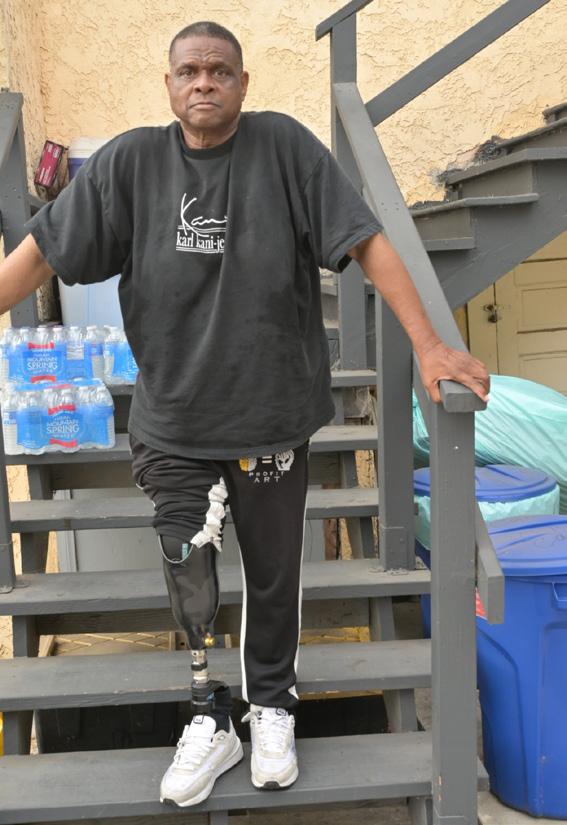
“It’s in horrible shape. It needs to get so much better, especially in underserved areas, where the Black population has a whole set of different needs,” she said.
Helms, who started advocacy after being denied access to care in the early 1990s, applauded new developments in telehealth. The opportunity to choose between vis-
New Law Tackles Hate, AntiSemitism ... Continued from page 7
“Today, California is sending a strong and unambiguous message — hate has no place in our schools and will not be tolerated,” said Assemblymember Jesse Gabriel (D-Encino) and Sen. Scott Wiener (D-San Francisco), co-chairs of the California Legislative Jewish Caucus. “We have been inspired by the leadership of our colleagues — and the incredible advocacy of Jewish students, parents, teachers, and leaders from across California — who fought tirelessly to protect Jewish children.”
Assemblymember Rick Chavez Zbur (D-Hollywood) added, “Every student deserves
“Don’t let anyone stigmatize you or tell you that you’re not good enough to get care or look down on you. Everyone has a right to good, quality, affordable, timely health care,” said Helms.
To engage Bloom Ranch for preventive care focused on wellbeing and healthy living, call (323) 3884828 or sign up at Bloomranchofacton.com
ed — no matter who they are or what they believe. At a time when hate is rising and anti-Semitism is sweeping our communities, AB 715 reaffirms California’s commitment to inclusion and standing up against bigotry in all its forms.”
Assemblymember Dawn Addis (D-Morro Bay) supported the bills saying, “This is a historic first-in-the-nation effort that centers on the well-being of children across our state, many of whom bravely shared horrific stories about their experiences in our schools.”
Sen. Akilah Weber Pierson (D-San Diego) said, “With these bills, we are sending a powerful message that our schools must be places of safety, belonging, and dignity for all students, regardless of their race, background, identity, or ZIP code.”

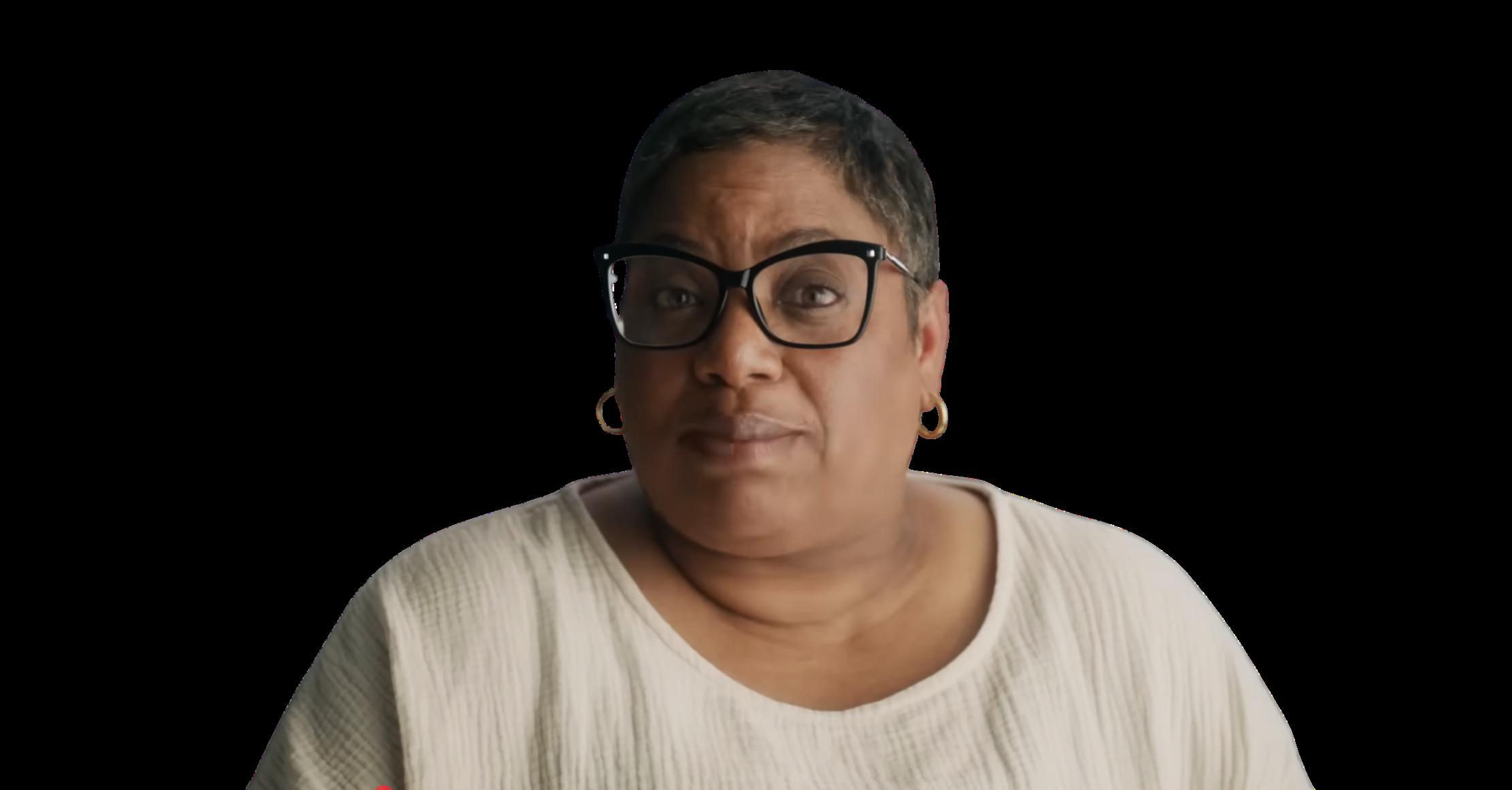




THE TRUMP ADMINISTRATION HAS:
SLASHED funds for critical education programs
DISMANTLED the Department of Education including the Office of Civil Rights
FIRED hundreds of thousands of federal employees, disproportionately affecting Black workers
CUT healthcare for millions of California students and families
Meanwhile, the wealthiest top 1% will receive $1 trillion in tax cuts from Trump’s Megabill over the next decade.
Historic College Graduation ...
Continued from page 1
“This is higher education in action,” Newsom stated. “Transformation and growth begin with opportunity. The courage these students have shown, taking meaningful steps to change their lives, not only inspires, but will contribute positively to our society well beyond the prison gates.”
For two years, graduates immersed themselves in up to four courses per semester, receiving frequent one-on-one career counseling. By the program’s end, each student had crafted a career portfolio, generated a LinkedIn profile, and was well prepared to pursue professional ambitions upon release.
California Department of Corrections and Rehabilitation (CDCR) Secretary Jeff Macomber emphasized the significance of this achievement: “Education has the power to transform lives. Expanding access inside our facilities means stronger, safer, and healthier communities throughout California. My congratulations to each graduate and thanks to all who made this possible.”
All faculty and tutors went through a rigorous faculty learning community program, focused on equity and critical thinking. Their curriculum connected classroom learning directly to real-world workplace skills. Sports icon and Cal State LA alum Billie Jean King, serving as keynote speaker, told graduates, “Never stop learn-
Argent Materials
Oakland ...
Continued from page 1
Oakland, and just a city-block-walk from the Oakland Coliseum BART Station.
Second, Argent Materials has been a friend to East Oakland and what some, like the members of the Oakland Private Industry Council, would call a “community asset”. In 2024, Argent Materials founder and President Bill Crotinger was named Leader of the Year by the Oakland Private Industry Council (OPIC) “I was humbled and honored to be named Leader of the Year by the Oakland Private Industry Council. Truly an honor. My heartfelt thanks to my friend and mentor Pastor Raymond Lankford and all the wonderful people at OPIC.”
Alameda County Supervisor Lena Tam had this to say about Argent Materials as an Oakland community asset: “Congratulations to Argent Materials and its President and Founder, Bill Crotinger! The company is now fully operational, recycling an impressive 99.99% of concrete and asphalt debris, which helps divert thousands of tons of construction waste from landfills. They are also proud to announce that 50% of their team consists of local hires. In celebration of Thanksgiving, and despite stormy weather last week, the Alameda County Sheriffs, alongside Mr. Crotinger and Argent Materials’ dedicated staff distributed turkeys and pies as a heartfelt gesture of gratitude to the community.”
ABI Foundry reports that Argent Materials led a community clean up for the residents and businesses of Russett Street as well as San Leandro Street. An ABI Foundry team member said “Bill Crotinger at Argent Materials spearheaded the initiative to clean San Leandro street, from Hegenburger to 98th Ave. along the side of BART. AB&I enjoyed participating along with Acts
Bobby Seale Way ...
Continued from page 1
to the establishment of the first Black Studies program in college curriculums in the country. Murrell is scheduled to introduce Seale at the street dedication.
ing. Never stop learning how to learn. Only you know what you overcame to reach this moment. Use this turning point, your new platform, live your future. Keep believing in yourself. Keep going for it.”
The historic partnership between CDCR and Cal State LA began almost 10 years ago and continues to expand. To date, it has transformed more than 118 lives, and for the 2025–26 school year, will serve 139 students across three California prisons. Through partnerships with the state’s public higher education systems, including California community colleges, CSU, and UC, incarcerated individuals can pursue associate, bachelor’s, and even master’s degrees. More than 13.5% of the state’s incarcerated population are currently enrolled in college courses.
Governor Newsom’s California Model prioritizes education and rehabilitation as pathways to improved public safety, supporting incarcerated individuals, staff, and crime survivors alike. Research demonstrates that every dollar spent on rehabilitation saves taxpayers over four dollars in re-incarceration costs, while those who complete educational programs are 48% less likely to return to prison within three years.
Victim advocacy groups strongly support these measures, preferring accountability that includes programming to prevent recidivism, such as job training and substance use treatment, by nearly a 3-to-1 margin.
Full Gospel C.O.G.I.C (Men of Valor), Good Hope Missionary Baptist Church-Oakland (Reverend Michael Jones) and Argent Materials. You should see how it looks now. It is AMAZING! It takes an ambitious mind to make a difference block by block.”
What Is Cleantech And Why Is It Important to Oakland And Argent Materials?
Clean technology (Clean Tech) refers to products, services, and processes that mitigate negative environmental impacts by increasing energy efficiency, promoting resource sustainability, and minimizing waste and pollution, ultimately contributing to a low-carbon, and more sustainable economy.
What is The Clean Tech of Argent Materials of Oakland?
In Argent Materials’ context, “cleantech” refers to their sustainable business model which includes recycling concrete and asphalt into new aggregate materials, diverting waste from landfills, and using renewable diesel for their fleet to achieve carbon neutrality and protect the environment. This business approach Argent Materials uses aligns with the broader definition of cleantech, which involves products, services, and processes that reduce negative environmental impacts through resource efficiency and environmental protection
Clean Tech, or green tech as Argent Materials of Oakland does it, is defined as any technology that minimizes negative environmental impact by reducing human consumption of natural resources and by promoting more sustainable and efficient resource use.
Argent Materials will continue to be a cleantech community asset to Oakland well into the future. Stay tuned.
The author of “Seize the Time,” Seale ran for mayor of Oakland in 1973, coming in second in a field of nine. We are proud to memorialize his legacy through renaming this street, so that we do not forget the legacy and change he has made.
980 Block Party ...
Continued from page 1
Future (collective visioning). Activities include:
● Interactive Visioning: Site mapping, 3-D/digital modeling, and design activities to reimagine housing, parks, culture, enterprise, and mobility.
● Story & Memory: Oral history circles capturing life before the freeway, the rupture it caused, and visions for repair.
● Data & Policy: Exhibits on health, environment, wealth impacts, and policy discussions.
● Culture & Reflection: Films, installations, and performances honoring Oakland’s creativity and civic power.
The site of the party – Preservation Park – itself tells part of the story of the impact on community. Its stately Victorians were uprooted and relocated to the site decades ago to make way for the I-980 freeway, which displaced hundreds of Black families and severed the heart of West Oakland. Now, in that same space, attendees will gather to reckon with past harms, honor the resilience that carried the community forward, and co-create an equitable and inclusive future.
A Legacy of Resistance
In 1979, Paul Cobb, publisher of the Post News Group and then a 36-year-old civil-rights organizer, defiantly planted himself in front of a bulldozer on Brush Street to prevent another historic Victorian home from being flattened for the long-delayed I-980 Freeway. Refusing to move, Cobb was arrested and hauled off in handcuffs—a moment that landed him on the front page of the Oakland Tribune.
Cobb and his family had a long history of fighting for their community, particularly around infrastructure projects in West Oakland. In 1954, his family was part of an NAACP lawsuit challenging the U.S. Post Office’s decision to place its main facility in the neighborhood, which wiped out an entire community of Black residents.
In 1964, they opposed the BART line down Seventh Street—the “Harlem of the West.” Later, Cobb was deeply involved in successfully rerouting the Cypress Freeway out of the neighborhood after the Loma Prieta earthquake.
The 980 Freeway, a 1.6-mile stretch, created an ominous barrier severing West Oakland from Downtown. Opposition stemmed from its very existence and the national practice of plowing freeways through Black communities with little input from residents and no regard for health, economic, or social impacts. By the time Cobb stood before the bulldozer, construction was inevitable, and his fight shifted toward jobs and economic opportunity.
Fast-forward 45 years: Cobb recalled the story at a convening of “Super OGs” organized to gather input from legacy residents on reimagining the corridor. He quickly retrieved his framed Tribune front page, adding a new dimension to the conversation about the dedication required to make change. Themes of harm repair and restoration surfaced again and again, grounded in memories of a thriving, cohesive Black neighborhood before the freeway.
The Lasting Scar
The 980 Freeway was touted as a road to prosperity—funneling economic opportunity into the City Center, igniting downtown commerce, and creating jobs. Instead, it cut a gash through the city, erasing 503 homes, four churches, 22 businesses, and hundreds of dreams. A promised second approach to the Bay Bridge never materialized.
Planning began in the late 1940s, bulldozers arrived in 1968, and after years of delays and opposition, the freeway opened in 1985. By then, Oakland’s economic engines had shifted, leaving behind a 600-footwide wound that resulted in fewer jobs, poorer health outcomes, and a divided neighborhood. The harm of displacement and loss of generational wealth was compounded through redlining, disinvestment, drugs, and the police state. Many residents fled to outlying cities, while those who stayed carried forward the spirit of perseverance.
The Big Picture
At stake now is up to 67 acres of new, buildable land in Downtown West Oakland. This time, we must not repeat the institutional wrongs of the past. Instead, we must be as deliberate in building a collective, equitable vision as planners once were in destroying communities. EVOAK!’s strategy is rooted in
four pillars: health, housing, economic development, and cultural preservation. These were the very foundations stripped away, and they are what they aim to reclaim. West Oakland continues to suffer among the worst social determinants of health in the region, much of it linked to the three freeways cutting through the neighborhood.
The harms of urban planning also decimated cultural life, reinforced oppressive public safety policies, underfunded education, and fueled poverty and blight.
Healing the Wound
West Oakland was once the center of Black culture during the Great Migration—the birthplace of the Black Panther Party and home to the “School of Champions,” the mighty Warriors of McClymonds High. Drawing on that legacy, we must channel the community’s proud past into a bold, community-led future that restores connection, sparks innovation, and uplifts every resident.
Two years ago, Caltrans won a federal Reconnecting Communities grant to fund Vision 980, a community-driven study co-led by local partners. Phase 1 launched in Spring 2024 with surveys and outreach; Phase 2, a feasibility study, begins in 2026. Over 4,000 surveys have already been completed. This once-in-a-lifetime opportunity could transform the corridor into a blank slate—making way for accessible housing, open space, cultural facilities, and economic opportunity for West Oakland and the entire region.
Leading with Community
In parallel, EVOAK! is advancing a community-led process to complement Caltrans’ work. EVOAK! is developing a framework for community power-building, quantifying harm, exploring policy and legislative repair strategies, structuring community governance, and hosting arts activations to spark collective imagination. The goal: a spirit of co-creation and true collaboration.
What EVOAK! Learned So Far Through surveys, interviews, and gatherings, residents have voiced their priorities: a healthy environment, stable housing, and opportunities to thrive. Elders with decades in the neighborhood shared stories of resilience, community bonds, and visions of what repair should look like. They heard from folks like Ezra Payton, whose family home was destroyed at Eighth and Brush streets; Ernestine Nettles, still a pillar of civic life and activism; Tom Bowden, a blues man who performed on Seventh Street as a child 70 years ago; Queen Thurston, whose family moved to West Oakland in 1942; Leo Bazille who served on the Oakland City Council from 1983 to 1993; Herman Brown, still organizing in the community today; Greg Bridges, whose family’s home was picked up and moved in the construction process; Martha Carpenter Peterson, who has a vivid memory of better times in West Oakland; Sharon Graves, who experienced both the challenges and the triumphs of the neighborhood; Lionel Wilson, Jr., whose family were anchors of pre-freeway North Oakland; Dorothy Lazard, a resident of 13th Street in the ’60s and font of historical knowledge; Bishop Henry Williams, whose simple request is to “tell the truth,” James Moree, affectionately known as “Jimmy”; the Flippin twins, still anchored in the community; and Maxine Ussery, whose father was a business and land owner before redlining.
EVOAK! will continue to capture these stories and invites the public to share theirs as well.
Beyond the Block Party
The 980 Block Party is just the beginning. Beyond this one-day event, EVOAK! Is building a long-term process to ensure West Oakland’s future is shaped by those who lived its past. To succeed, EVOAK! Is seeking partners across the community— residents, neighborhood associations, faith groups, and organizations—to help connect with legacy residents and host conversations.
980 Block Party Event Details Saturday, Oct. 25
10 a.m. – 4 p.m. Preservation Park, 1233 Preservation Park Way, Oakland, CA 94612 980BlockParty.org info@evoak.org
OPD Chief Floyd Mitchell ... Save Liberty Hall ...
Continued from page 1 Continued from page 1
1877, this two-story Italianate landmark has witnessed more than a century of struggle, self-determination, and community empowerment. Now, its survival hangs in the balance.
For generations, Liberty Hall has been more than bricks and wood — it has been a spiritual and cultural sanctuary for Black Oakland. The building once served as a hub for Marcus Garvey’s Universal Negro Improvement Association (UNIA), where Garvey’s call for economic independence and Pan-African unity resonated through the hearts of a people newly migrating to the West in search of freedom and dignity.
Local 188 of UNIA was the largest chapter in Northern California when the organization bought the building in 1925, but a fire burned the roof in 1931 and the chapter sold the building in 1933. The International Peace Movement, founded by Father Divine, used the building through the 1950s.
Since then, the building has been a meeting ground for civil rights organizers, artists, and educators like Overcomers With Hope who have carried that same flame of liberation through Oakland’s turbulent decades.
Today, local cultural organizer and artist Douglas “Pharoah” Stewart has stepped forward to lead the charge to save Liberty Hall. Stewart is already facing “Cultural Eviction” at the Oakland Cannery, and through his organization, Indigenous House, Stewart has rallied a coalition of artists, educators, historians, and community leaders to preserve and restore the site as a community-owned cooperative center — a place where arts, wellness, and economic empowerment can thrive for future generations.
“Liberty Hall is not just a building — it’s a living ancestor,” Stewart says. “This space gave birth to movements that shaped who we are as a people. If we lose this, we lose a piece of our soul.”
“The women and men of the Oakland Police Department have my full support as we work together to ensure a smooth transition and continue building on the progress we’ve made for Oakland’s residents,” Lee said
seen significant reductions in crime – a testament to his commitment to public safety and the hard work of our police officers,” said Lee. “I am grateful for Chief Mitchell’s collaboration with our administration and his focus on community-centered policing.
Stewart envisions transforming the historic landmark into a multi-purpose cooperative hub — complete with a cultural museum, community performance space, youth tech labs, and creative studios for local entrepreneurs. His vision echoes Garvey’s own: “A place where we can rise together, economically, spiritually, and culturally.”
But the fight is urgent. The aging building faces structural challenges, and time is running short to secure preservation funding. Stewart and his team are now calling on city officials, foundations, athletes, and celebrities to join forces with the community to raise the necessary capital for acquisition and restoration.
“We’re inviting everyone — from the Oakland A’s to local artists, from Golden State Warriors players to Black-owned businesses — to stand with us,” Stewart urges. “Let’s make Liberty Hall a model for what preservation can look like when the people lead.”
The Liberty Hall Project aligns with Oakland’s growing movement to protect historic Black cultural sites — places like Esther’s Orbit Room, Marcus Bookstore, and the California Hotel. For Stewart, Liberty Hall represents a chance to bridge the city’s past with its future, transforming preservation into a living, breathing act of justice.
“This is not nostalgia,” Stewart says. “This is nation-building. It’s about creating sustainable, community-owned spaces that honor our ancestors and empower our youth.”
As development pressures mount across West Oakland, Liberty Hall stands as a powerful reminder of resilience, resistance, and rebirth. The question now is whether the community — and those with the power to help — will answer the call. For donations, partnerships, or information about the Liberty Hall Cooperative Development Project, contact Indigenous House at www.indigenoushouse.org Douglas Stewart dstewart.wealth@gmail.com.

Special to The Post
Hon. Pamela Price, the former Alameda County District Attorney, has launched her podcast, “Pamela Price Unfiltered,” on YouTube. The podcast covers news and
Port of Oakland
September Cargo ...
Continued from page 1
same period last year. Full imports rose 1.6%, and full exports were up 0.5%, reflecting stable performance amid tariff-related volatility in global markets.
The Port recorded 82 vessel calls in September compared with 90 a year ago. However, average vessel utilization climbed to 2,193 TEUs per call, up 1.8%, signaling continued deployment of larger ships and operational efficiency across terminals.
“While trade patterns are shifting in response to global tariff uncertainty, Oakland continues to demonstrate stability and resilience,” said Bryan Brandes, Port of Oakland maritime director.
“We’re seeing larger ships and steady year-to-date growth, which reflects the confidence carriers and cargo owners have in Oakland’s
politics with unfiltered conversations on law, culture, education, systemic racism and current events shaping our world. Her goal is to help listeners navigate the complexities of today’s world. This week’s guest is famed civil rights attorney Carl E. Douglas discussing his recent $3.8 million verdict against the Los Angeles Sheriff’s Department on behalf of a protester shot in the face in 2020.
Famous guests coming up in Season 2 include gospel icon Donnie McClurkin, Hon. Nina Turner, Dr. Lael Alexander, and Hon. Larry Krasner.
Price’s weekly column can be found on Substack and the weekly show is broadcast on YouTube or wherever you get your podcasts on Tuesday evenings.
long-term position as a key gateway for U.S. trade.” Port officials said the September slowdown reflects changes in how cargo is moving through global supply chains. Some importers accelerated shipments earlier in the year to avoid potential tariff impacts, which reduced typical fall peak activity. On the export side, California’s agricultural and refrigerated shippers continue to manage softer overseas demand and cost pressures tied to tariffs.
“The Port of Oakland remains focused on long-term infrastructure investment and achieving our sustainability goals,” said Port Executive Director Kristi McKenney. “Even in months when global market conditions fluctuate, we’re building the infrastructure and partnerships that ensure Oakland stays competitive and continues to serve our regional economy and support the nearly 100,000 jobs that the Port of Oakland creates.”